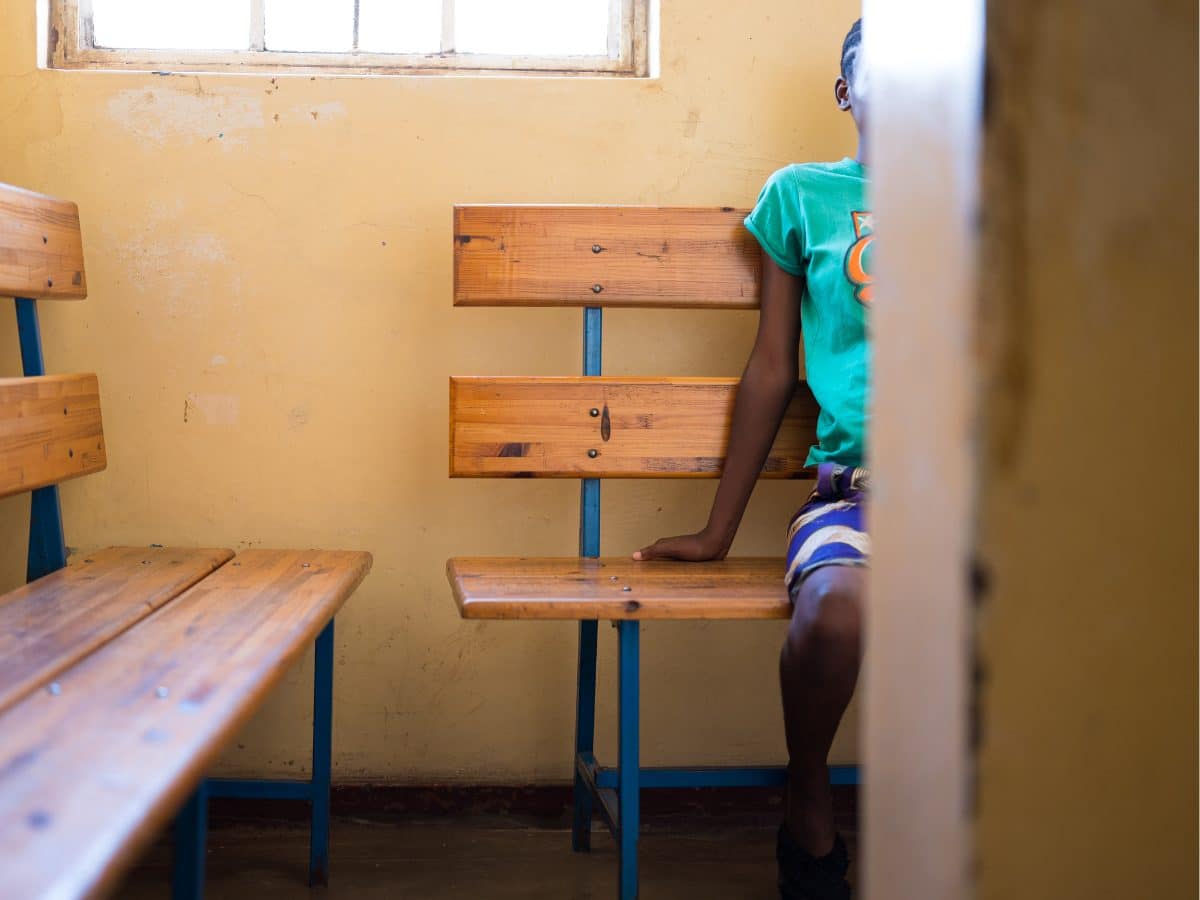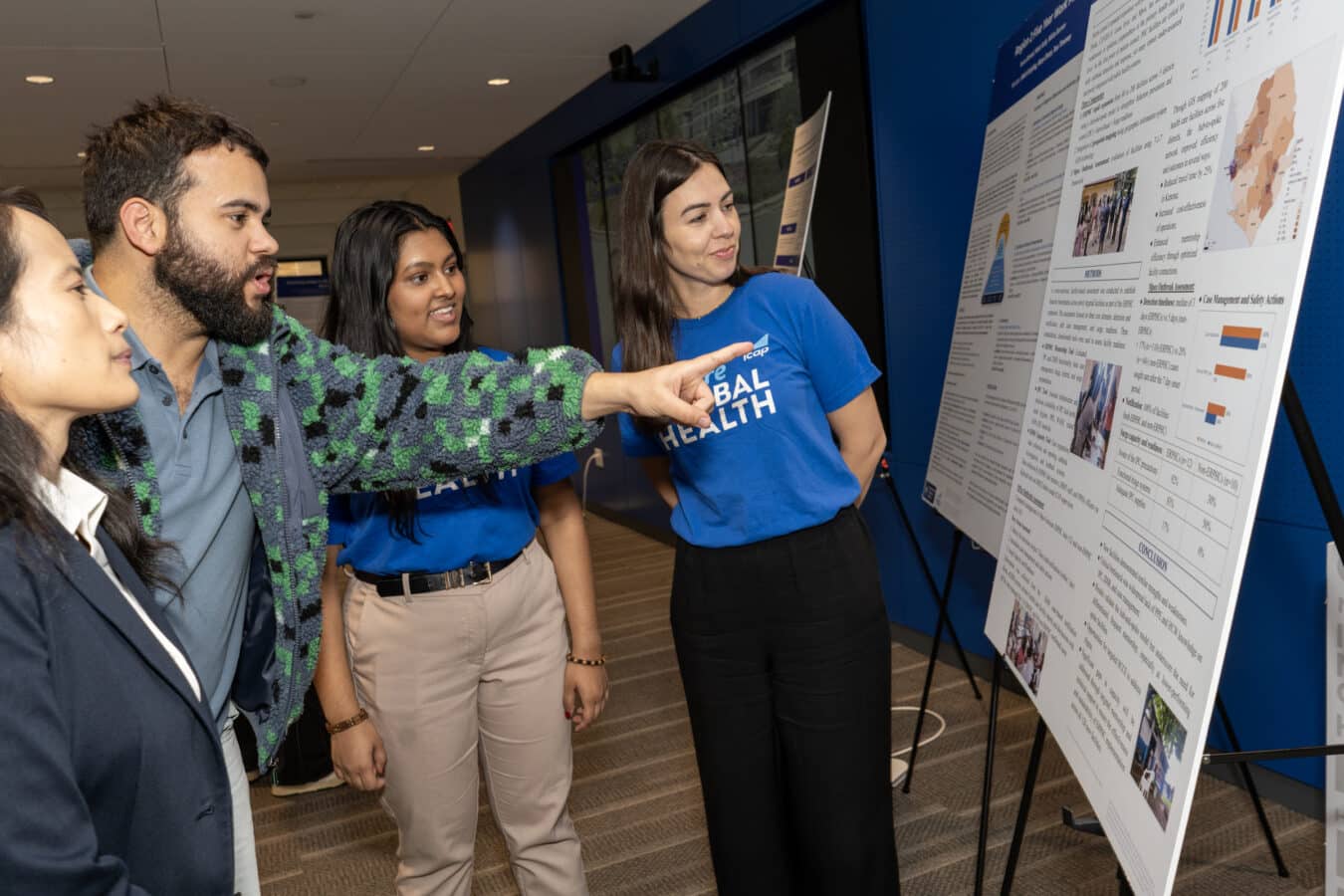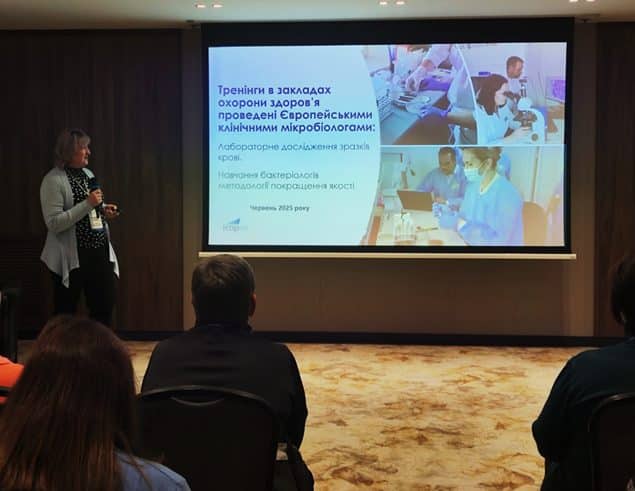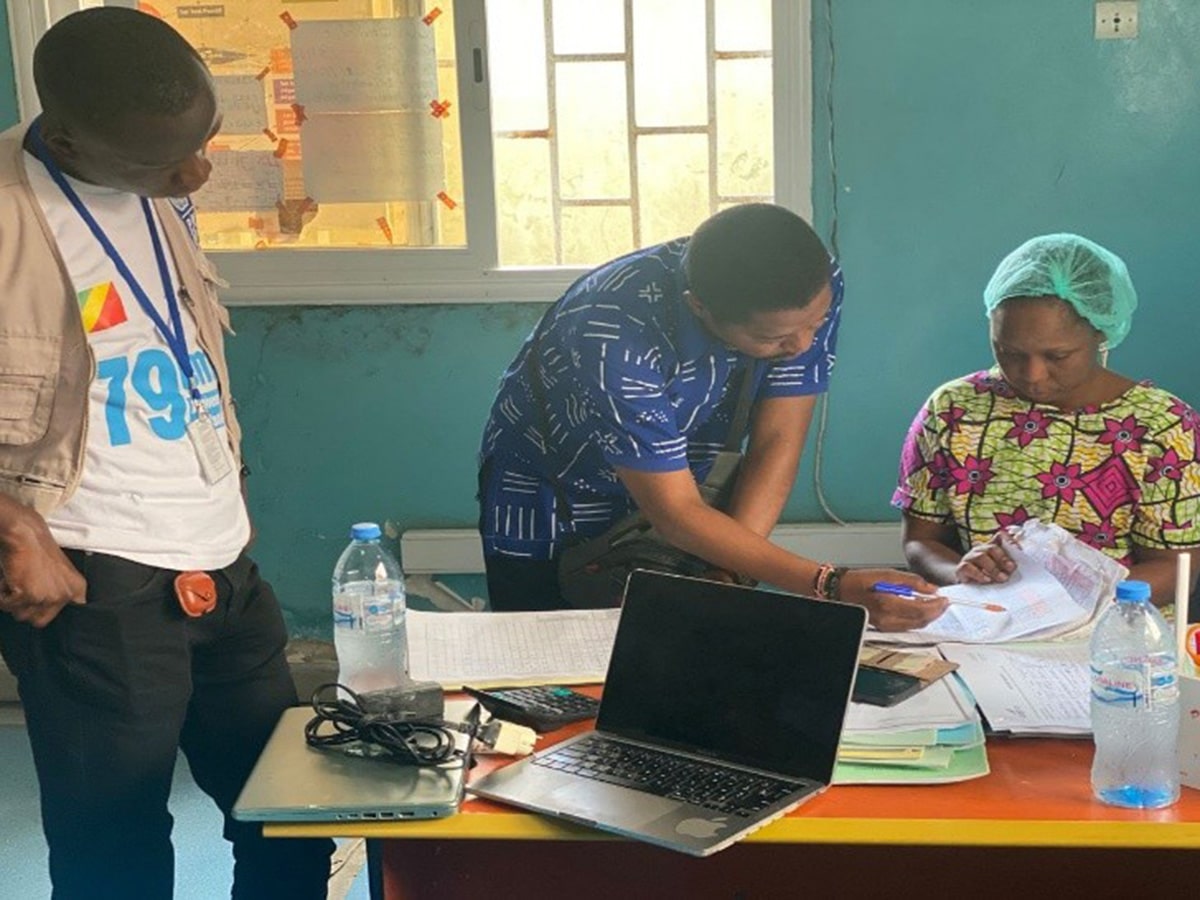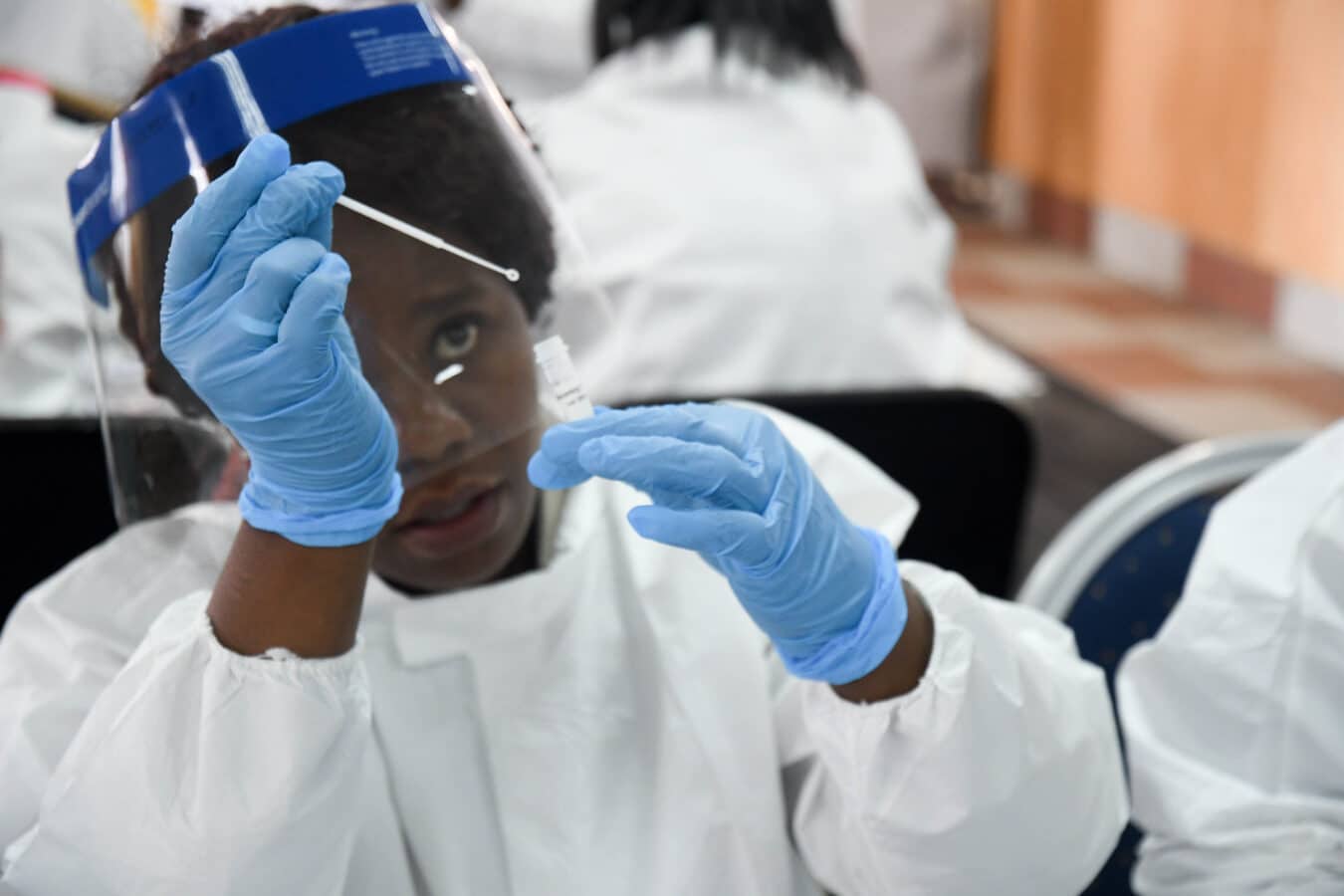ICAP supported the first biobehavioral survey (BBS) among people who inject drugs (PWID) in Zambia, the results demonstrating both successes and gaps in progress made toward the UNAIDS 95-95-95 global targets.
Conducted between November 2021 and February 2022 in the Zambian cities of Ndola, Livingstone, and Lusaka, the BBS estimated the prevalence of HIV, recent HIV infection, active syphilis, hepatitis B (HBV), hepatitis C (HCV), HIV viral load suppression (VLS), and HIV risk behaviors, as well as PWID population size. The survey was conducted by ICAP in collaboration with the Zambia National HIV/AIDS/STI/TB Council and the Tropical Diseases Research Centre (TDRC), with support from the Centers for Disease Control and Prevention (CDC).
Key populations, including PWID, often face obstacles such as stigma that limit access to vital health services, leading to disproportionate risk of acquiring HIV. The 2022 UNAIDS Global AIDS Update notes that the risk for acquiring HIV is 35 times higher among PWID than adults who do not inject drugs. Biobehavioral surveys are essential for measuring such factors as barriers to seeking health services, uptake of health services, and size of key populations, which must be better understood for strategic and effective national HIV resource and service planning.
The BBS of PWID in Zambia demonstrated that HIV prevalence among PWID was higher among women than men and HIV prevalence was generally higher among populations older than 35 years. The survey also showed that the prevalence of HIV among PWID was highest in Ndola (21.3 percent), compared to Livingstone (12.2 percent) and Lusaka (7.3 percent).
The percentage of PWID living with HIV who were aware of their HIV status was 72.9 percent in Livingstone, 66.0 percent in Lusaka, and 61.9 percent in Ndola. Among PWID living with HIV who were aware of their HIV status, antiretroviral treatment (ART) coverage was 100 percent in Livingstone, 82 percent in Lusaka, and 100 percent in Ndola, and among PWID living with HIV on ART, VLS was 100 percent in Livingstone, 73.3 percent in Lusaka, and 83.7 percent in Ndola.
According to the survey, active syphilis prevalence was highest among PWID in Ndola (10.8 percent) compared to Livingstone (3.7 percent) and Lusaka (4.2 percent), and the prevalence of HBV was lowest among PWID in Livingstone (1.9 percent) compared to Lusaka (4.5 percent) and Ndola (2.6 percent).
“PWID living with HIV show admirable progress with uptake of HIV testing and treatment services,” said Neena Philip, PhD, MPH, an epidemiologist and principal investigator of the study. “Barriers to continued progress nonetheless remain. Discrimination, fear of reprisal, and lack of harm reduction care, like syringe service programs and accessible drug treatment, pose notable threats to health and wellbeing. Ongoing efforts to mitigate social stigma and increase access to complementary prevention services will be key.”
Importantly, the survey assessed common practices and experiences among PWID, which is vital to understanding some of the gaps that may contribute to the HIV epidemic. For example, the survey showed most PWID in Livingstone (57.3 percent) and Ndola (67.2 percent) shared needles in the last six months, compared to 29.1 percent in Lusaka. A wide range, 32.2 percent to 54.2 percent, of PWID across all three sites reported that they had ever avoided seeking health care services for fear of being identified as a person who injects drugs. Many PWID identified having faced stigma; for example, 32.7 percent to 68.1 percent of respondents had been rejected by their family at some point.
Across all three locations, awareness of pre-exposure prophylaxis (PrEP) among HIV-negative PWID was low, and uptake among those who had heard of the HIV prevention medication was also low, with 16.2 percent in Livingstone, 11.9 percent in Lusaka, and 22.7 percent in Ndola.
“It’s essential that we understand the context and real-life circumstances of people who inject drugs so that more targeted programs can be developed to address the factors that contribute to the HIV epidemic,” said Tafadzwa Dzinamarira, MSc, MPH, PhD, country director of ICAP in Zambia. “The recent survey findings underscore the need for several key strategies, including providing differentiated HIV services for people who inject drugs and other vulnerable groups, along with increased access to condoms and education on the dangers of sharing needles.”
Following survey interviews and rapid testing of participants, referrals for care at key population-friendly clinics were provided for those who tested positive for any infection, while HIV-negative individuals were referred to PrEP.
The dissemination meeting for announcing summary findings of the survey was held on February 29, 2023 in Zambia, attended by representatives from CDC, UNAIDS, TDRC, KP Consortium, and others. The guest of honor, Professor Christopher Simoonga, Permanent Secretary for Administration in the Ministry of Health, reiterated in the meeting’s keynote address how the survey findings can be used to inform HIV service delivery in the country.
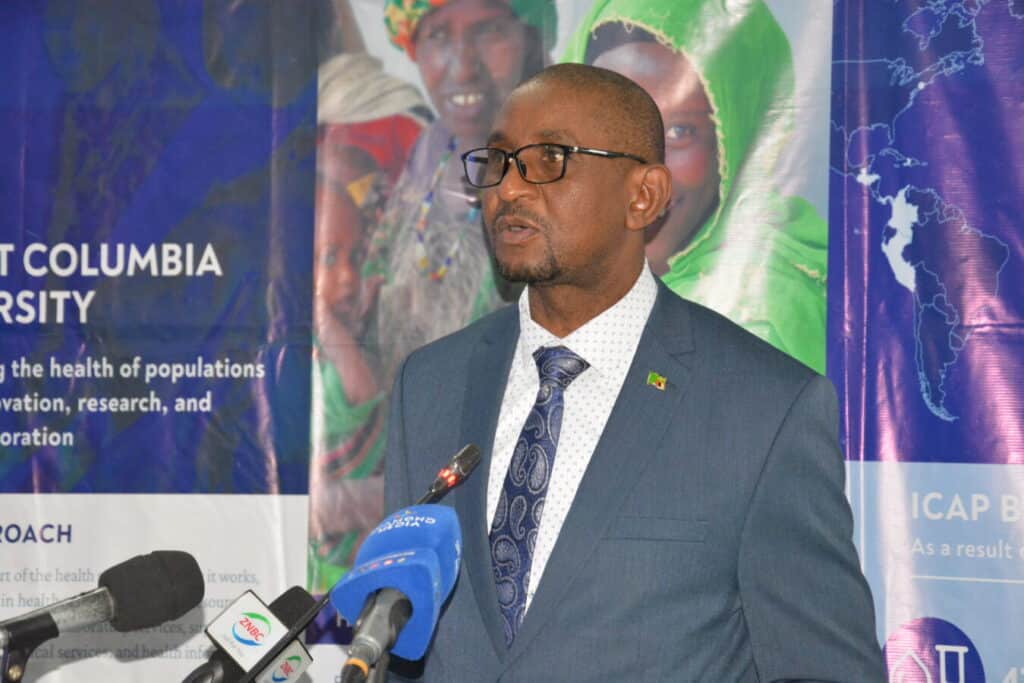
Professor Christopher Simoonga delivers the keynote address at the biobehavioral survey results dissemination event.
“The Ministry of Health will remain steadfast,” Professor Simoonga said, “on the path of equitable and equal access to HIV services through differentiated HIV combination prevention, treatment, care, and support services focusing on key and vulnerable populations such as children, adolescents, and young people.”
The PWID survey is one of three biobehavioral surveys ICAP has supported in Zambia, with the biobehavioral survey among men who have sex with men and biobehavioral survey among female sex workers finalized in 2021 and 2023, respectively.
About ICAP
A major global health organization that has been improving public health in countries around the world for two decades, ICAP works to transform the health of populations through innovation, science, and global collaboration. Based at Columbia Mailman School of Public Health, ICAP has projects in more than 40 countries, working side-by-side with ministries of health and local governmental, non-governmental, academic, and community partners to confront some of the world’s greatest health challenges. Through evidence-informed programs, meaningful research, tailored technical assistance, effective training and education programs, and rigorous surveillance to measure and evaluate the impact of public health interventions, ICAP aims to realize a global vision of healthy people, empowered communities, and thriving societies. Online at icap.columbia.edu


